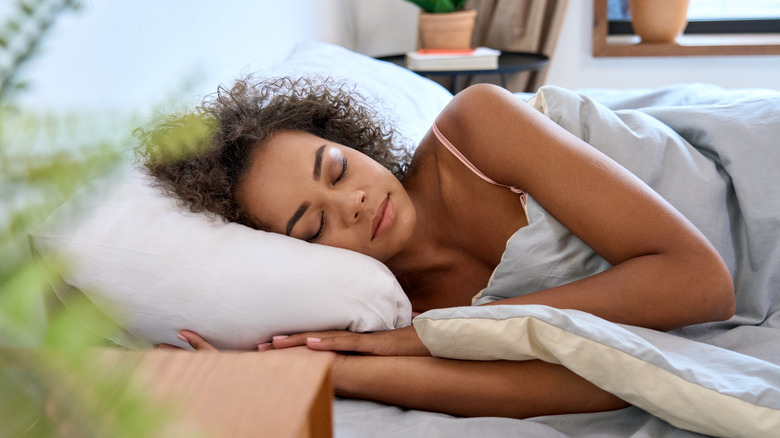Although we all need sleep to function properly, sometimes catching good quality sleep can be tricky. Whether we toss and turn during the night or have trouble falling asleep — it’s hard to function on poor sleep. Operating on minimal sleep can negatively impact overall health and affect cognition, sex drive, hormones, mood, and more, states MindBodyGreen. However, according to Dr. Mark Hyman, sleep drive, sleep duration, and overall sleep hygiene can be deeply improved through food (via MindBodyGreen).
Sleep experts and nutritionists agree there are some foods that promote quality sleep. For instance, one 2024 review published in Advances in Nutrition found that eating kiwis before bed improves sleep time and overall quality of sleep. Another fruit with sleep benefits is tart cherry juice, according to a 2024 study published by the American Journal of Therapeutics. Research has found that tart cherries have high amounts of melatonin, which reduces inflammation and increases sleep efficiency and duration (via Sleep Foundation).
Believe it or not, focusing on foods that are rich in gut-friendly bacteria and balance your blood sugar will help promote rest, shares Hyman (via MindBodyGreen). Opt for eating quality whole foods with proper portions of carbs, proteins, and healthy fats. Research shows nuts, fatty fish, and rice are good options, too (via Sleep Foundation).
Foods to avoid to greatly improve sleep

Although certain foods prompt a peaceful night’s rest, there are some foods you should skip altogether. Any foods containing high levels of caffeine, sugar, or alcohol (e.g., coffee, soda, ice cream, chocolate) should be avoided because they spike blood sugar levels and decrease rapid eye movement (REM) sleep (via Sleep Health Solutions). Other food items you may want to say goodbye to are spicy foods, fatty foods (such as burritos and burgers), pizza, and cheese, according to Eat This, Not That!. Some cheeses should be avoided because they contain tyramine, a neurotransmitter that can potentially increase alertness.
Beyond foods, there are other habits that can support sleep. For instance, eating meals around the same time each day can also help your body promote sleepiness around the same time (via MindBodyGreen). Aim to eat your last meal of the day at least two hours before bed so your food can fully digest, then you’ll want to start reducing light exposure, the latter of which includes phones, TVs, tablets, etc. Instead try reading a book, meditating before bed, enjoying a cup of chamomile tea, or connecting with a family member.